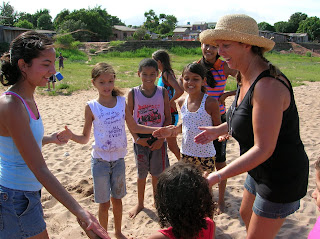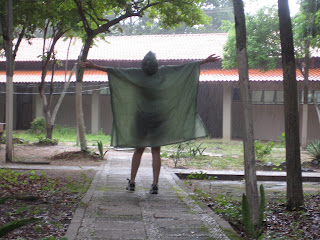Today’s video was produced by the team Paz.
Wow. A day that we may remember for the rest of our lives. We worked today with the kids from the neighborhood around our construction worksite. About thirty (maybe 40?) of them showed up for art and recreation activities, along with some English lessons from us. There was a bit of hesitation when we first got started, but once things clicked in, they clicked in fully.
We got to the beach with the supplies that we bought during the week and started setting up. Georgete was interested in teaching painting today, but the wind was a bit daunting. We set up a big tarp for her anyway, along with a couple of canopies under which the kids (and we) could find some shade. We weren’t quite sure how things would unfold, and we especially weren’t sure what the specific agenda was. None of that mattered, though.
When the last of us walked onto the beach, the kids swarmed around us like we were celebrities. They showed us a “low-five, then fist-bump” handshake that they said they use with their friends. We asked if that meant we all are friends now and they said that it did. They were right.
We played games. We taught them some English (“Hello. How are you? I am fine.” “I like ice cream.” “Head, shoulders, knees and toes . . .”). They taught us some Portuguese. They kicked our butts in soccer (fútbol). We took their pictures. They took pictures of themselves with us (on our cameras). They dragged us in the water and splashed us. They held our hands and hugged us. A few of them asked for kisses (but didn’t get them).
Throughout the day we became more and more aware of the language barriers between the kids and us, but our awareness of those barriers only helped us to find ways around them. We’ve gotten very good at charades here, and we have all taken up a much more physical way of talking through the use of exaggerated gestures and overly performative facial expressions. (We think that we are really going to annoy people at home with these new practices, especially the dramatic overuse of the double “thumbs up.”) The incredible warmth and openness of the kids, though, helped us to overcome all barriers and to find a way into their world.
Their world might look pretty bleak from the outside, but even in this single day we got a real sense of the joy that their lives embody. We ran through examples of young kids we know in the U.S. whose lives revolve around video games and other forms of technological interaction. For these kids, though, their lives are about their friendships, kite-flying, soccer, the river, and the possibility that they might make new friends who have come from far away. It was a pleasure and a privilege for us to be the newest friends in their lives today.
When we left at lunchtime, a few of us stayed behind to complete the deck we started yesterday. We installed a railing and fixed some of the places where the whole thing just wasn’t square. It took a while, but we got it done. For the rest of us, we found out that a morning in the sun doesn’t prove how exhausting it is until after lunch. During siesta time, we crashed. We needed to crash. When we awoke, we learned that our otherwise very effective SPF 50 sunscreen had let a little bit of pinkness through on some of us. We also realized that we were sore and tired, but there was no doubt whatsoever that it was worth it.
A bunch of us went into town in the afternoon to get beach towels, as tomorrow afternoon we are going to visit a river beach after another morning with the kids. Tonight we are going to bed early so that we can get up and attend an early morning mass at the church in the center of the city.
The one downside to today was that our Rider of the Purple Bike, Margeaux, needed to sleep in all day because of a minor illness. She is better tonight, but she missed her day of purpleness. We’ll find a way to make it up to her.

Soccer game organized by the kids themselves.
 We all worked together to set up tents for kids to do their artwork.
We all worked together to set up tents for kids to do their artwork. A little boy was eager to learn how to use a camera....
A little boy was eager to learn how to use a camera.... ...and this was the successful picture (of the entire group) he took.
...and this was the successful picture (of the entire group) he took. The kids thought it'd be funny to drag their new American friends into the water to play.
The kids thought it'd be funny to drag their new American friends into the water to play. The girls who came to the camp taking some pictures all together.
The girls who came to the camp taking some pictures all together. Everyone joining in on the circle game and having a great time.
Everyone joining in on the circle game and having a great time. Ana making a sand castle with two very cute little girls.
Ana making a sand castle with two very cute little girls. Felicia and Mercedes posing with all the girls after having some fun in Lake Papaco.
Felicia and Mercedes posing with all the girls after having some fun in Lake Papaco. Joey and Joe giving a local boy the time of his life in the water.
Joey and Joe giving a local boy the time of his life in the water. Shawny and Mercedes learning Brazilian hand games. These are the last contenders in the game that began with over 40.
Shawny and Mercedes learning Brazilian hand games. These are the last contenders in the game that began with over 40. The kids learned to kayak today. These girls were a little nervous.
The kids learned to kayak today. These girls were a little nervous. Two iguanas walked across the sidewalk outside our living quarters. They are both larger and quicker than we expected.
Two iguanas walked across the sidewalk outside our living quarters. They are both larger and quicker than we expected. Tara and our jungle cat Zily taking a siesta.
Tara and our jungle cat Zily taking a siesta. Georgete taught art lessons on the beach today. They use recycled objects as brushes and natural products as stencils.
Georgete taught art lessons on the beach today. They use recycled objects as brushes and natural products as stencils.

































